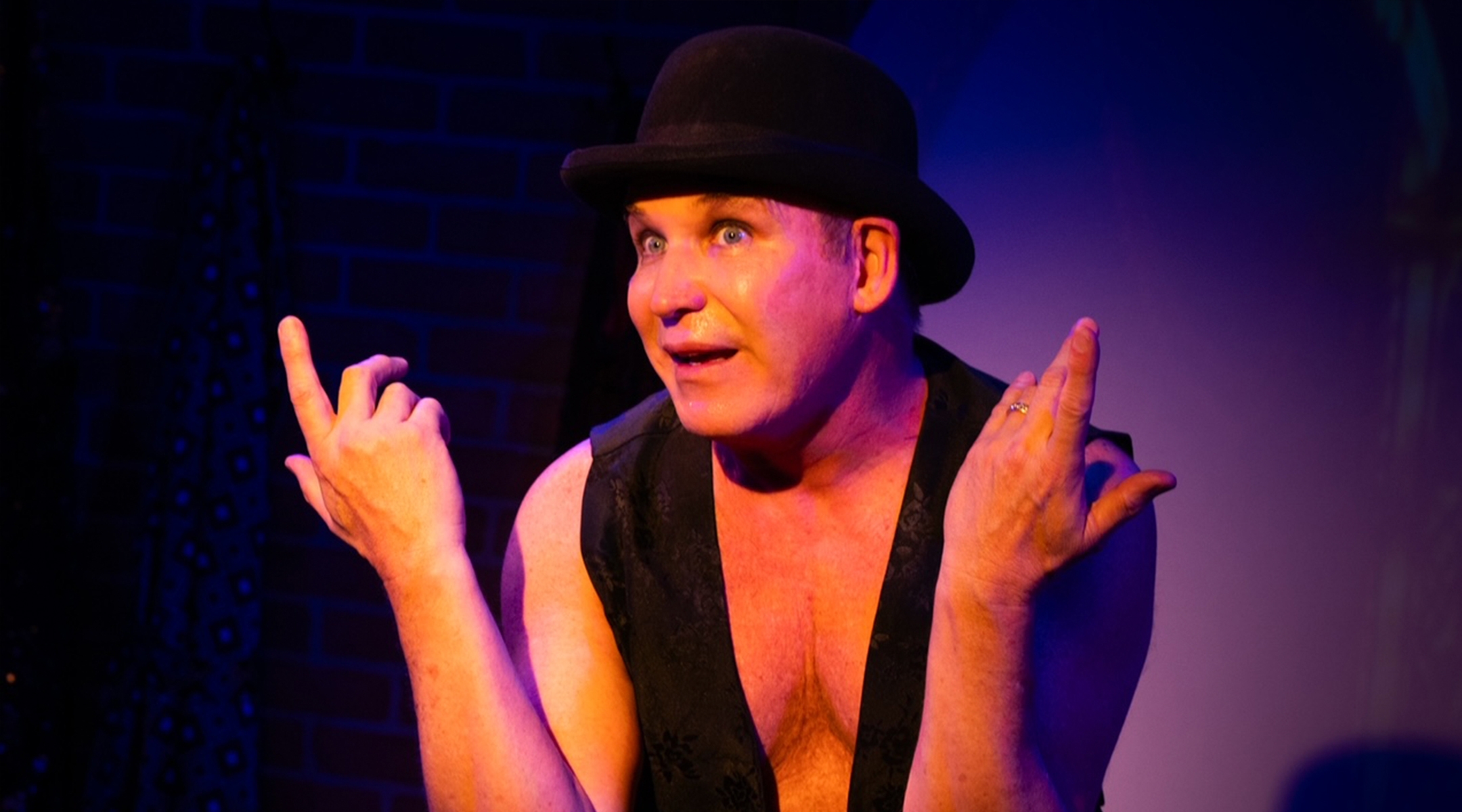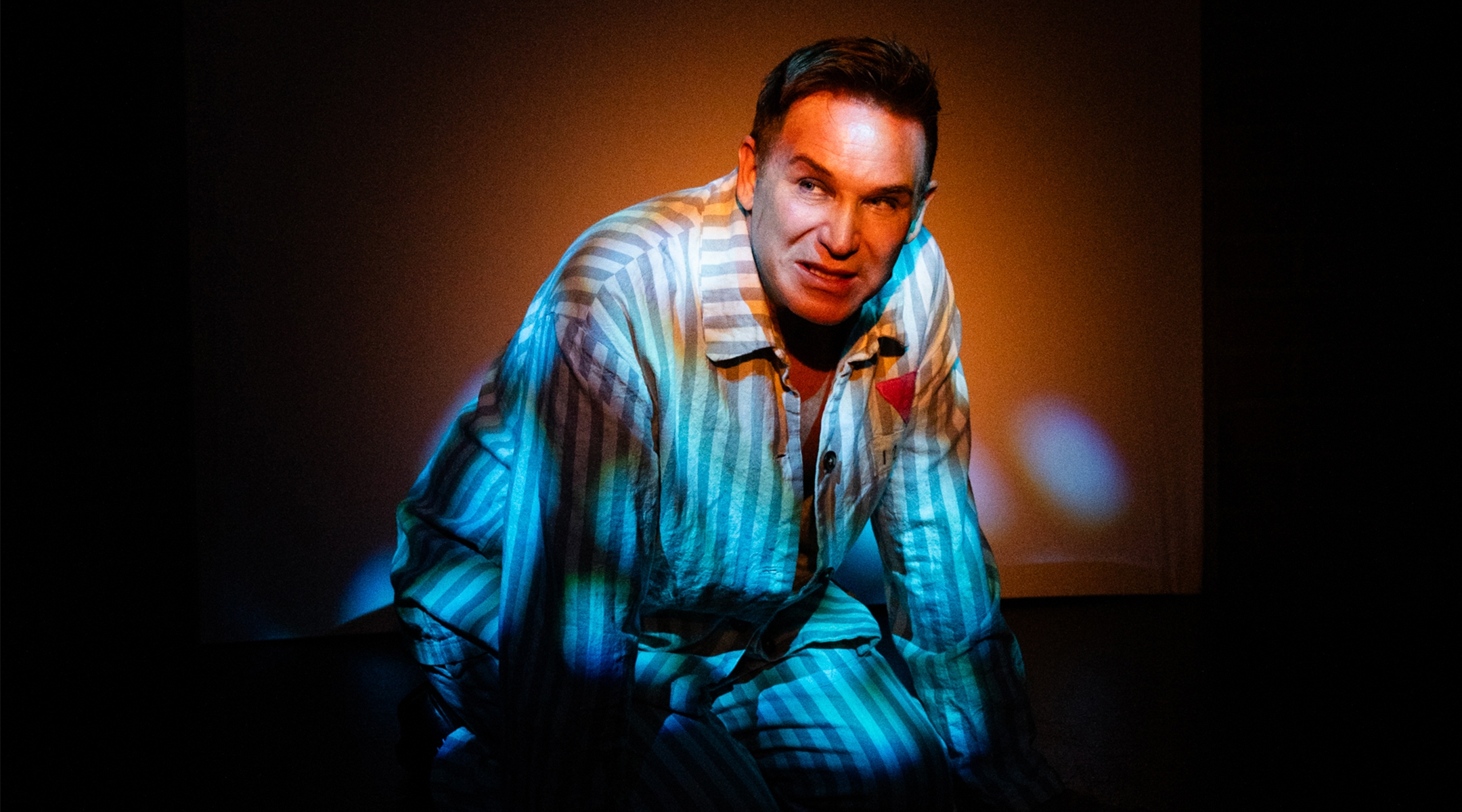(New York Jewish Week) — Some 50,000 gay men and women were imprisoned by Nazis during the Holocaust. Of them, approximately 10,000 to 15,000 were held in concentration camps, and nearly all of those who were sent to the camps died there.
And yet, many stories of LGBTQ+ people who died in Nazi prisons are left untold. The numbers, while huge, shrink in comparison to the millions of Jewish people who died and were tortured at the hands of the Nazis.
This dynamic is why writer, director and actor Alan Palmer first learned about Nazi persecution of homosexuals completely by chance. In August 2016, Palmer — who is best known for his off-Broadway show “Fabulous Divas of Broadway” and his role on the “Mighty Morphin Power Rangers” — was performing at Edinburgh Fringe Festival when he stumbled upon an article about the specific targeting of gay men and women under Hitler. He found himself falling into a world of ever-deepening research, consumed by the idea that there were so many lost stories of LGBTQ+ people who died in concentration camps.
Inspired, Palmer decided to travel to Germany. There, he visited some concentration camps and saw pictures of the gay men who were imprisoned there. “I found these beautiful photos of these people who were Jewish and trans” and gay], Palmer said. “Being a writer of musicals by trade, the pictures started me on a journey of writing this new piece.”
This “new piece” is Palmer’s one-man play, “Chanteuse: A Survival Musical,” which he’s currently performing at Here Arts Center (145 Sixth Ave.). The play relates the story of Werner, a gay man in 1930s Berlin who assumes the identity of his landlady, a German woman who had died unexpectedly, in order to avoid persecution and imprisonment. A performer by trade, Werner reinvents himself as a chanteuse and begins singing for his supper, and survival, in the clubs of Berlin. “It’s fictional, in a way, because there’s no [single] person who had this experience,” Palmer told the New York Jewish Week. “However, each one of the pieces [in the play] is true.”
The play explores the precarity of survival and how intersecting identities complicate ideas about oppression and freedom. “There are heart-wrenching stories of Jewish families whose relatives were killed during these times. And some of those people were gay — but you don’t hear about them much,” Palmer said. “The reason is families didn’t talk about it back then. If Uncle So-and-so was sent away [before the round-ups of Jews intensified], no one talked about why. So all of these records of people who existed are just gone.”

Palmer plays Werner, a gay man in 1930s Berlin who assumes the identity of his landlady to escape Nazi persecution. (Russ Rowland)
Despite being raised in a Mormon community in Salt Lake City, Palmer said he’s long felt a kinship with Jews. “As soon as I left [home] I began to make lifelong friendships with Jewish people, mostly because of theater. You can’t have theater without Jewish people or gay people!” he said. “When I see the rise of antisemitism today I just think: ‘For gosh sakes, how can people keep attacking this group of people?’”
As “Chanteuse” unfolds, Werner, like so many gay men during that time, isn’t able to escape the long arm of the Nazi regime for long. He is eventually outed and imprisoned in a concentration camp, where he both experiences and witnesses brutal violence and dehumanization. “Even though the Jewish people are in another camp on the other side of the wall, there are still a small number of gay Jews on this side. On Friday evenings, the gay Jewish men pray,” he relates, in a touching monologue toward the end of the scene.
“Chanteuse,” written and performed by Palmer and directed by Dorothy Danner, is about memorializing those whose stories were lost. Throughout the play, Werner relates stories of LGBTQ+ prisoners as well as Romani people, people with mental and physical disabilities, and, of course, Jewish people he meets throughout his calamitous journey. It is also, however, about creating connections to the rise in anti-LGBTQ+ legislation and antisemitism in the current age.
To that end, Palmer curated a mini pop-up museum, displayed in the atrium outside the theater, that presents information about what happened to members of the LGBTQ+ community in Europe during World War II. “I envisioned people engaging before the performance and having the information sink in during the play,” Palmer said. “But it’s interesting to see how many people walk past all of these panels, and after the show they went out to the museum and actually spent time reading and viewing the history.”
According to the United States Holocaust Memorial Museum, gay men were “often subjected to physical and sexual abuse by camp guards and fellow inmates,” and some were “beaten and publicly humiliated.” Some of these prisoners were also subject to inhumane medical experiments or forced castration, according to the USHMM. These “pink triangle prisoners,” named for the badge they were forced to wear in the camps, were arrested for breaking an existing German law that made same-sex relations illegal in the country.
The exhibit draws direct connections between the use of the legal system and false medical science by the Nazis and the current rise in vitriol directed towards the LGBTQ+ community in America and around the world. While our government isn’t conducting forced castrations of gay men and women like the Nazis did, given the veritable flood of anti-LGBTQ+ (and particularly anti-trans) laws being passed by state governments across the United States, Palmer believes we should be paying very close attention to these legislative moves before it’s too late.
“History cannot repeat itself,” Palmer said. “People are being silenced. They’re being forced to hide. I’ve never lived in a closet, I’ve always been myself. My truth was always out there. The idea that people like me are being told they can’t live their whole truth is frightening to me.”
But bringing historical documentation into the experience isn’t the only way in which “Chanteuse” is a multimedia project — it’s also musical, with a score written by award-winning composer and arranger David Legg. “The music serves almost as a spoonful of sugar: It helps the information go down easier,” Palmer said.
Stylistically, the score implements melodic and harmonic elements of both early-‘30s-era jazz and traditional European Jewish music. The instrumentation (piano, tenor saxophone, percussion and upright bass) was chosen by Legg in order to facilitate this evocative musical landscape. “We ended up putting an underscore through the entire piece,” Palmer said. “It created a continuity, so you never feel it’s disjointed — dialogue, song, dialogue, song — the audience is never shocked out of the world we’re creating.”
And yet, Palmer insists that his created world is very relevant to the one we’re living in today. While it may seem unimaginable for something as horrifying as the Holocaust to repeat itself, Palmer said he and his co-creators want to remind audiences of the current trends towards authoritarianism around the world as they watch Werner navigate the terror of being gay in 1930s Berlin.
“Around the United States, we’re seeing more and more bans of drag performance, of gay media,” Palmer said. “And I think drag, like any other art form, is a way of storytelling. It isn’t anything people should be afraid of.”
“This is a moment in which it’s important to say, ‘We all need to work together,’” he added. “You know, if every persecuted group stood strong together, we’d be surprised at how quickly things would turn around in a positive way.”
“Chanteuse” is being performed at Here Arts Center (145 Sixth Ave.) on Tuesdays through Saturdays through July 30. For tickets and additional info, click here. In order to allow broader access to the musical, 10 tickets priced at $10 are available for each performance on a first come, first served basis.
The New York Jewish Week brings you the stories behind the headlines, keeping you connected to Jewish life in New York. Help sustain the reporting you trust by donating today.





